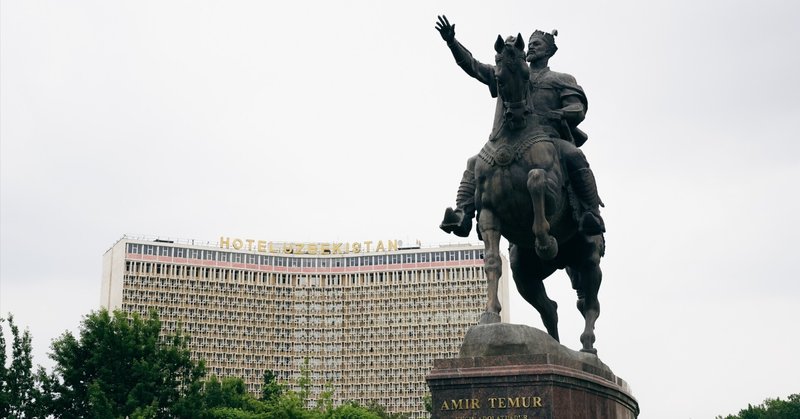
旅で見つける余白 Living Your Own Time
今週もタシュケントにいます。
This week, I am still in Tashkent.
先週お伝えしたとおり、タシュケントは春を迎え、町中は緑に囲まれ、とても心地よい日々を送っています。そんなこともあり、毎日、特に観光をすることもなく、本を読んだり、考え事をしたりして過ごしています。改めて、人生において、余白・余裕が大切であると思う1週間になりました。
As I mentioned last week, Tashkent has welcomed spring, and the town is surrounded by greenery, making for very pleasant days. I spend my days without any particular tourism, just reading and reflecting. This week has reinforced my belief in the importance of having margins and space in life.


僕の旅のテーマは「その土地に暮らすように過ごす」なので、特に観光をしたいという欲がありません。むしろ、観光地に行くと息苦しくなってしまうくらいになってしまいました。食事一つとっても、ローカルの人が毎日通うような、そんな場所に足を運びたいのです。そして、カメラを手に、人々の日常を切り取る。周りの人にとってみたら、わざわざ他の国に行ってまで何しているのだろうか、もったいない。と思われるかもしれませんが、僕にとってはとても贅沢な時間の過ごし方なのです。
My travel theme is "living as the locals do," so I have no particular desire to do tourist activities. In fact, visiting tourist spots has become somewhat suffocating. Even with something as simple as dining, I prefer places frequented by locals. Capturing everyday life with my camera might seem wasteful to some, but for me, it is a luxurious way to spend time.


多くの人が、社会に出ると、仕事を中心に人生の歩みを進めることになるでしょう。それは、2日間の「自分の時間」のために、5日間もの間、他の人のために自分の命を使うのです。もちろん、楽しいこともあるでしょう。けれども同時に、ストレスフルなことも多いはずです。時にはイライラしたり、自分でさえも嫌な自分になってしまうかもしれません。そんな時、ストレス発散と称して、あるいは、より良い5日間を過ごすために、お金をお酒や食事、あるいはどうでもいいようなことに使ってしまうことさえあるでしょう。これでは、生きるために仕事をしているのか、仕事をするために生きているのか分からなくなってしまいます。
Most people, once they enter society, center their lives around work, spending five days for others just to have two days for themselves. Of course, there are enjoyable moments, but often it's also filled with stress. Sometimes this leads to frustration and even self-loathing. At such times, people might spend money on things like drinks or meals, or even trivial pursuits, supposedly to relieve stress or to make the five days bearable. This can blur the line between working to live and living to work.


加えて、1日の中で自分に使える時間が限られてしまい、人生の中での「余白」がなくなってしまうようにも思います。人生本当はやりたいことで溢れているはずだと僕は思うのです。旅をしたい、音楽を作ってみたい、本を書いてみたい、起業してみたい。挙げ出したらきりがありませんが、そういった好奇心にどこか蓋をしてしまっているのは、その「余白」がないことが原因なのかもしれません。それは、時間的な「余白」でもあり精神的な「余白」でもあります。そんな時に大切なのが、終わらせること・手放すことだと、佐宗邦威さんは著書『じぶん時間を生きる』で語っています。何を隠そう、僕もこの本を読んで、それまでの仕事を手放してみる決断ができたのです。
Furthermore, the limited time available in a day diminishes the 'margins' in life, which should be filled with things we truly want to do, like traveling, making music, writing books, or starting a business. The list could go on, but perhaps we cap our curiosity because we lack these margins—both in terms of time and mental space. In such times, it's crucial to know when to end things or let go, as Mr. Kunihisa Saso mentions in his book "Living Your Own Time." Inspired by this book, I made the decision to let go of my previous job.


そこでできた「余白」の中で、色々な本を読んだり、街を歩いたり、写真を撮ったり、人と話したりすることで、本当に自分のやりたいことが見えてくるのだと僕は思います。例えば、起業のアイデアを思いついたとしても、「余白」がなければ、それを実行に移すこともできないかもしれません(余白のある僕は実際に行動に移せています!)。やりたい時に、やりたいことをやる。なかなか簡単そうで難しいかもしれませんが、まずは手放すことが大切なように思います。そのためにもいくつかの準備は必要だと思いますが、またその話は別の機会にまとめたいと思います。
In the 'margins' that have been created, I find that reading various books, walking the streets, taking photos, and talking with people help reveal what I truly want to do. For instance, even if I come up with an idea for a startup, without these 'margins,' I might not be able to act on it (thankfully, I am able to act because I have these margins now). Doing what you want when you want may seem simple but can be challenging. Letting go is essential, and while it requires some preparation, I plan to discuss that at another time.

この記事が気に入ったらサポートをしてみませんか?
